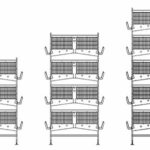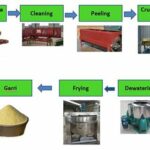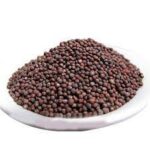Weather is unquestionably the most crucial aspect in determining agricultural productivity. This is because the majority of field crops require soil, water, air, and sunlight to grow and they rely on the weather to deliver the same. As a result, food availability, accessibility, and quality are all affected by climate change. Hence, understanding and implementing effective dry season food production strategies become a necessity for every farmer.
Nigeria has a tropical climate with varying rainy and dry seasons and the majority of Nigerian farmers rely on rain-fed agriculture to get the water they need for their crops. This is because rain is the most efficient and cost-effective means of watering. It is also a lot more manageable.
The dry season, on the other hand, is defined either by a lack of rain or a low amount of rainfall and most farmers are unable to secure sufficient water resources to participate in large-scale agriculture. Consequently, essential local crops are in short supply which poses a problem as food should be available all year round (even in the dry season) in order to ensure global food security.
4 Effective Dry Season Food Production Strategies for Farmers
To increase food production output as a crop farmer, here are 4 effective strategies you can follow even during the dry seasons:
- Adequately prepare your land:
The first stage in dry-season farming is to prepare the land for cultivation. The preparation procedure differs slightly from that used in wet season farming. Land preparation involves clearing, flattening, and grading the surface. You can then apply fertilizers afterwards.
- Plant warm-temperature vegetables:
Some crops thrive even during dry seasons. Warm-season vegetables planted during the dry season will remain fresh and healthy with minimal effort and manual watering. Examples include onion, carrot, tomato, pepper, cucumber, okra, eggplant, garden egg, melon, pumpkin, spinach, sweet potato, and maize.
- Employ an effective farm irrigation system:
Irrigation is the science of planning and developing a man-made water delivery system in farmlands to protect crops from the negative effects of drought or low rainfall. Rather than relying solely on rainfall, this method uses water provided by pipelines, sprinklers, canals, sprays, pumps, and other man-made elements to water crops. It is used as an alternative to rain-fed agriculture.

Water for irrigation can be obtained from dams, lakes, rivers, wells, ponds, reservoirs, canals, and tube wells, among other places. Irrigation meets the water requirements of plants and crops, which are crucial resources for growth. It also helps to provide plants with the nutrients they need for development and growth, as well as achieving high yields by allowing roots to penetrate dry regions.
There are different methods of irrigation including manual watering, sprinkler systems, and drip irrigation, etc. The farmer decides on the best method to use depending on the sort of crop to be planted. Tomatoes and vegetables, for example, benefit from the drip system. On the other hand, crops like rice and millet, on the other hand, do well with rain gun irrigation.
- Follow basic planting tips:
During the dry season, plant early in the morning or late in the evening. Also, follow the proper plant spacing and distance. This is necessary in order to avoid crop competition. After planting, you should also water daily or as needed.
Over time, these food production strategies in dry seasons have proven to be effective. For example, irrigation has helped desert ecosystems such as Jordan and Israel turn to farms. This has helped them to meet their food demands without relying on rain. Dry season farming, if well planned and implemented, would allow for all-year-round farming. It is capable of solving the problems of poverty and food insufficiency.
Now you are all set, go into your farms and make food!
Read Also: Why Your Farm Needs An Efficient Irrigation System














2 thoughts on “Food Production Strategies In Dry Seasons”
Good article and write up I learn something.
Hello Ali Farms,
Thanks for your comment! We love hearing from readers, so feel free to share the article with your friends. We’ll keep you updated with more articles.